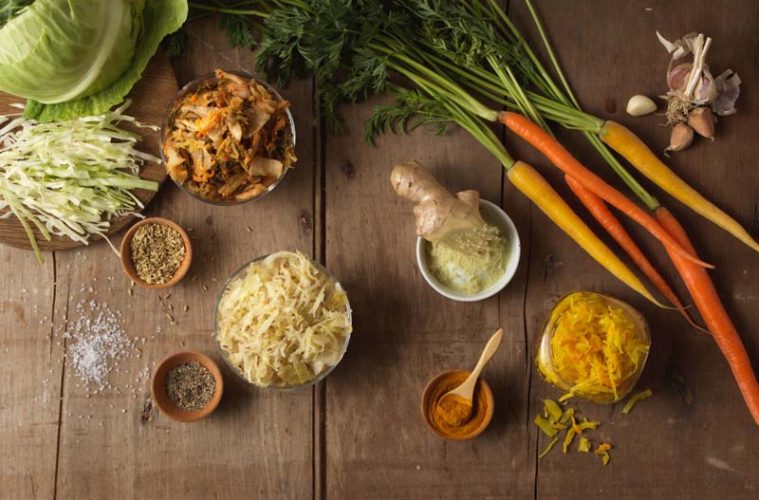Kristen L’Abbe-Lindquist’s go-to breakfast is a bagel topped with cream cheese and kimchi, the spicy Korean mix of salty fermented vegetables flavored with chilies.
“I’m not usually a breakfast person, but I crave that,” says L’Abbe-Lindquist. It’s not a bagel topping that most people crave, but then, most people aren’t running their own fermented foods business.
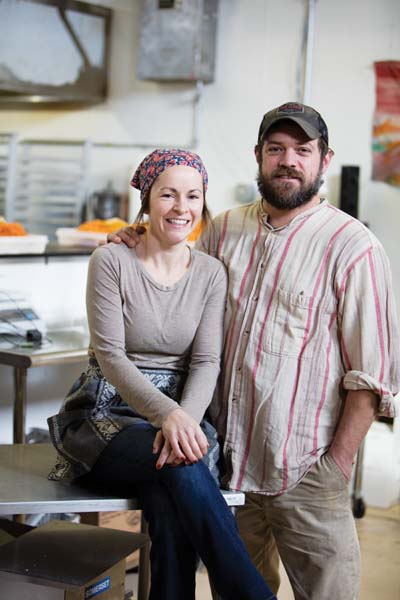
With blends ranging from exotic kimchi to classic sauerkraut, L’Abbe-Lindquist and her husband, Dylan, launched Pigeon Cove Ferments from their Rockport kitchen almost two years ago. The timing couldn’t have been better, as more and more information has been coming out about the health benefits of probiotics—which are found in spades in sauerkraut and other fermented foods.
Fermentation is one of the oldest food preservation methods around, but it is having a moment right now as more and more research indicates a connection between nurturing good bacteria and digestive health, weight loss, and even managing diabetes.
Kristen saw the opportunity while working at Common Crow Natural Market in Gloucester after their son, Ronin, now two and a half, was born. “I noticed that sauerkraut was flying off the shelves, but no one was doing a hyper-local version,” she says. Turning to a bevy of friends who are farmers, and making use of Dylan’s experience with fermentation—he works full-time as head brewer at Cape Ann Brewing Co. in Gloucester—they set about crafting their own kraut.
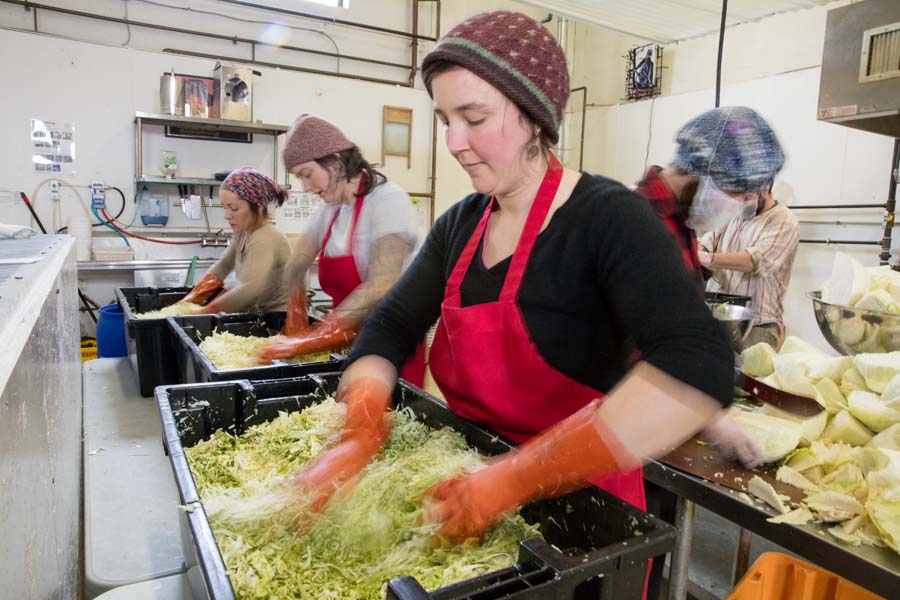
Starting with Atlantic Saltworks in Gloucester (whose product is derived from water Dylan and Kristen can practically see from their backyard), the Pigeon Cove list of suppliers reads like a who’s who of local farms. Cedar Rock, in Gloucester, and Appleton and Three Sisters, both in Ipswich, are among the growers who keep them well supplied with everything from cabbage to fennel, but Alprilla Farm in Essex stands above the rest.
“Without them, we wouldn’t be doing this,” Kristen says, noting that Alprilla has ramped up their cabbage production to meet Pigeon Cove’s increasing demand. But they still need more. Last year, their first year of production, they ran out of product in April and May because they ran out of cabbage.
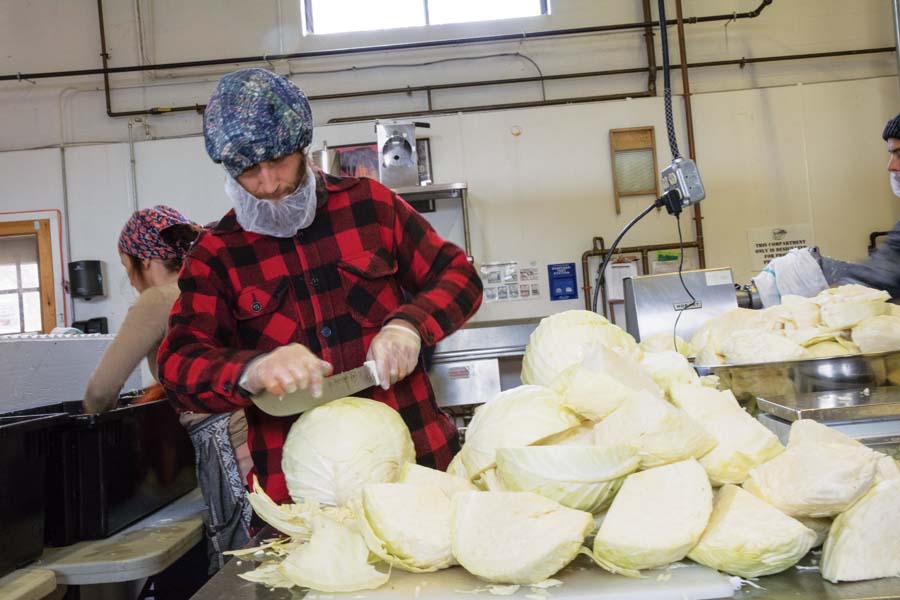
“We could have bought it from somewhere else [outside of Massachusetts], but that’s not what we’re about,” Dylan says, adding that they hope that the 6,000 pounds of cabbage they had in cold storage in November will carry them through to the first harvest of 2018.
It’s easy to confuse pickled and fermented; when it comes to vegetables, both result in a salty, sour final product. But many pickled products are created by soaking vegetables in a vinegar mixture, while fermented foods are mixed only with salt, and create their own brine. This happens over time, as good bacteria eats away at the sugars and carbohydrates present in the food, converting them to lactic acid. This prohibits the growth of bad bacteria while creating a wealth of probiotics—and a darn tasty raw vegetable product. The fermented vegetables may have more vitamins than their fresh siblings, and are also packed with calcium.
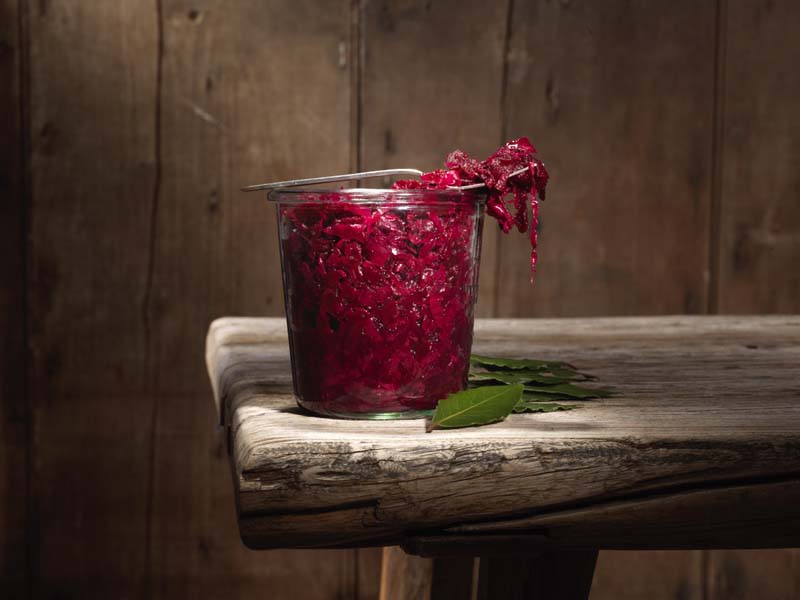
Test batches for new products lurk in corners of the L’Abbe-Lindquist home—on a recent visit, a sweet, oniony kraut and a cranberry-apple-ginger kraut were fermenting in beautiful crocks in their living room. But the real production takes place in a converted restaurant in Gloucester. During harvest season, Pigeon Cove processes between 1,000 and 1,400 pounds of vegetables a month to make seven staple flavors, including garlic dill and ginger beet, as well as small-batch experiments, but their first kraut, turmeric ginger, is still their most popular. Kristen dreamed that one up—combining trendy anti-inflammatory ingredients with a probiotic kick. Garden harvest, using a mix of basil, Thai basil, and mint, was a one-off last summer, while seaweed also makes an occasional appearance.
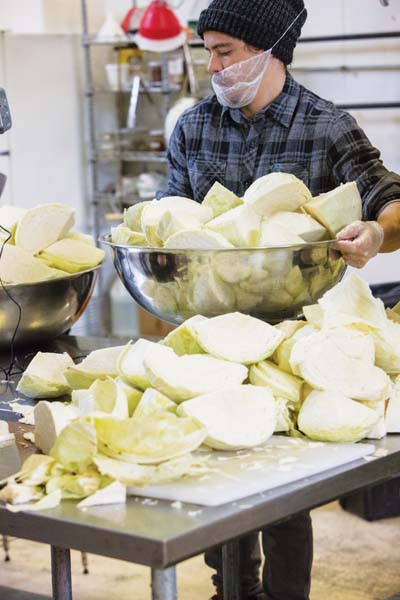
“We are trying to make sauerkraut fun,” Kristen says, admitting that takes some education. “Some people are like, ‘Ew, gross.’ But this is not the stuff your grandmother served from a can.” Certainly not—Kristen hopes to produce a rosemary–black sesame kraut soon.
“I have ideas all the time,” Kristen says, adding that it’s usually Dylan’s job to figure out how to turn them into a recipe that will work.
Drawing on 15 years working in restaurants and 10 years of brewing, Dylan is up to the challenge. Making sauerkraut “harkens back to my days in restaurant kitchens—I have all this stuff in front of me. Now let’s see what I can do with it.” pigeoncoveferments.com

